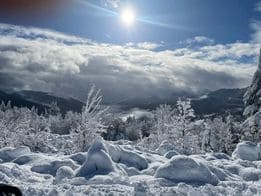Hoopa Valley’s Acorn Wireless celebrated one year of its first internet subscriber this week. Although they have had their share of difficulties, Acorn Wireless is a huge success for Hoopa Valley. Being located in the northwestern part of California, a mountainous region, they are no strangers to harsh weather. Being prepared is the best course of action, but sometimes problems still arise.
“So there’s this one tower that we have on Sugar Pine, which is on the reservation. It’s a dirt road, and it goes from the valley floor at 300 feet above sea level up to like 4,600. There’s a wide range, even over a nine-mile stretch where it’s high elevation, the weather changes. It’s a lot colder, harder to access. Our entire network went down, and they tried to go up in this little side-by-side. They could only get so far up and couldn’t make it any farther. They were having to cut out trees and that’s when they say that a tree fell in front of them. And so, I mean, that could really harm somebody, it’s dangerous. The electrician who is pretty hardcore went all the way back home and brought back his Bobcat that has like these metal tracks. He ended up going all the way up to our remote tower site. It took him four hours to get up there in a snow storm in the dark. What happened was we built this hut that should have protected the generator, but there was so much snow and wind that the snow ended up brushing up against the generator and covering that controller. It’s not like there was a design flaw, but there was something else that needed to be in place in case of these major storms, that it wouldn’t interrupt the control service to be able to communicate to that generator. There was like four feet of snow up there, and he was so hardcore because once he got up there, it took him about an hour to make sure that everything was reset and communicating that the signal was going through any network triggers that needed to happen. We did get the Wi-Fi back up and running, so at least people are getting some kind of updates. So I will say like in that winter emergency, like it’s critical, not only for Wi-Fi, but just for your entertainment, but for communication.” explained Linnea Jackson general manager at Hoopa Valley Public Utilities.

Resiliency is an important priority to Hoopa Valley, ” We’re trying to get to a point where we can be as resilient as possible, but obviously that equals dollars. Not only for the equipment but for the engineering design on it, the sizing of it. How much power draw is the equipment, how is it tied to anything else that you would need to consider, like the energy consumption for it? Making sure that it’s, you know, tied in and hooked up properly. So it’s, pretty involved and each site is different, so it’s not like, this is what we installed at one site, but it might not work for the next.” said Linnea.
Her advice is to work with what you can. For example, one of the tower sites lacked sufficient power. “There’s no generator there, there’s no power. And there’s no solar obviously, but what we did do was have an electrician install, a transformer. So then we could at least hook up a small generator to get that site up and running. Obviously it’s not optimal to continue to run diesel generators or gas generators, but if it can provide some resiliency to get you through until fixes are made. It’s so important to be able to tie in and have that manual transfer switch hooked in, it’s just like a plug and play. And then you started this generator up. So those switches are critical.” described Linnea.
When in the planning process, it is a good idea to prepare for the future. “In a perfect world, you would design your system to be prepared, but with startups we didn’t know necessarily that all of these issues would happen, so we didn’t know to prepare for it until after the fact. I think just having that knowledge of saying, if we can’t afford this, now we need to at least build or allow it to be expandable to include these things in the future. So if you’re building a site, leave some room for a propane tank or, you know, whatever, leave some space for that generator building that has, you know, solar capability. Even if you can’t afford it at that moment, consider that in the design from the beginning. So you can like upscale to them.” Linnea advised.